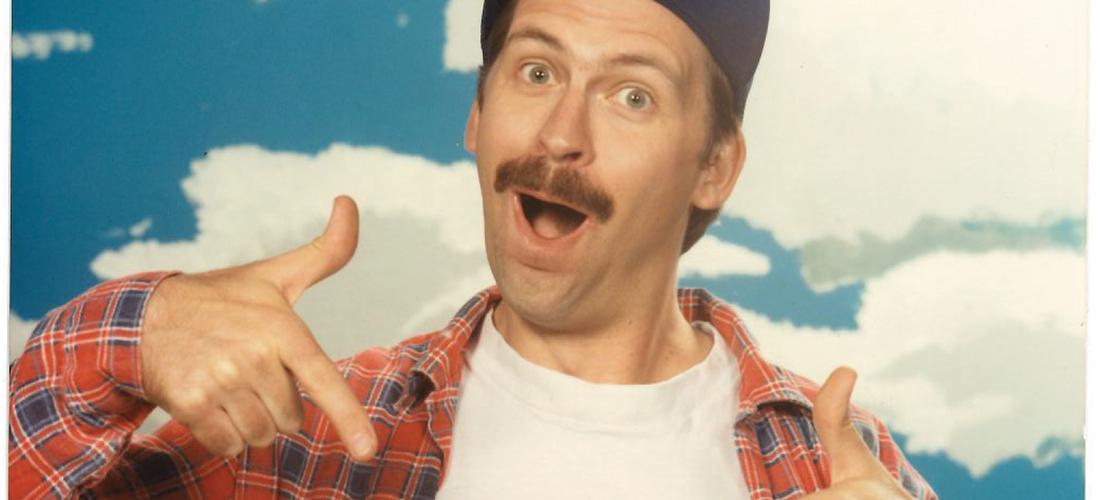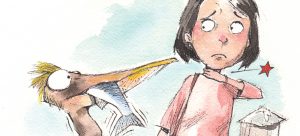
Adventures in Television
How a hat and a T-shirt accidentally changed everything for a young Greensboro comedian
By Billy Eye
Television is an invention that permits you to be entertained in your living room by people you wouldn’t have in your home. — David Frost
“Why are you contacting me now?” Dana Ralph Lowell texted me.
Good question. Lowell had reached out to me much earlier, but now that I was compiling a database of local children’s programming for my website, TVparty.com, I had finally gotten back to him — 10 years after he’d first contacted me. Whoops.
Perhaps you remember him as Billy Bobb?
Back in the early 1980s, when WGGT channel 48 (“The Great Entertainer”) entered the Triad TV market, its bread-and-butter were schlocky horror movies, “professional” wrestling and former primetime network shows.
Broadcasting from the Cone Export building near the Carolina Theatre, this small UHF (ultrahigh frequency) station struggled financially from the very beginning. Then, in 1987, due to the success of Elvira’s Movie Macabre in national syndication, WGGT tapped local comedian Dana Lowell to host horror features on Saturday nights.
And they wanted him in character.
“As a member of a comedy troupe in the early ’80s, Lowell created Billy Bobb — “Almost like what Paul Reubens did with Pee-wee Herman” — as a way of lampooning local kids’ show hosts.
And the station loved Billy Bobb, as did his growing fan base.
“It was a zero-budget situation,” Lowell tells me of Billy Bobb’s Action Theatre. The set was “actually the news set turned around backwards to make it look like a garage.”
Billy Bobb hosted kung fu movies, then low-budget sci-fi and B-horror flicks.
The popularity of Billy Bobb’s Action Theatre led to a daily afternoon kiddie show.
Just like Greensboro’s own beloved Old Rebel Show on WFMY, local kiddie shows winked off the airways by the late-1970s, to be replaced by syndicated cartoons, often flogging children’s toy lines. Someone at WGGT thought the time was right for a revival.
“I never set out to be a kids’ show host,” Lowell insists, but he suddenly found himself hosting a daily cartoon show with a peanut gallery of young children on set.
As a nightclub comedian,” he says, “I didn’t know what made little kids laugh. I was rating my work by how much I could make the cameraman laugh, or the director in the booth.”
For Billy Bobb’s Fun Club, afternoons from 4–5 p.m., Lowell converted a Pac-Man machine into a puppet theater. “Junior Prankster became a little sidekick buddy for Billy Bobb,” says Lowell. It was all off-the-cuff. “We were on almost five years and never had a script.”
Kids wrote in by the thousands to receive their fan club certificate and hear their name mentioned on their birthdays.
Billy Bobb began eclipsing Dana Ralph Lowell.
Lowell received the princely sum of $25 per episode and $25 an hour for public appearances. “I had a two-part act going,” Lowell says. “Doing Billy Bobb in nightclubs, then doing Billy Bobb during the day on television.” Even though, adjusted for inflation, $25 is worth $50 in today’s dollars, “the most I made for a year being that popular TV character was $5,000 [$10,000 in today’s dollars], so it was not exactly fame and fortune.”
He recalls an encounter in costume with a child at the mall.
“He screamed and he came running up to me and said, ‘How did you get out of my TV? Did you get out of the TV at my house and then come here?’ He thought I lived in the television set.”
Besides filming car commercials airing on other stations, Billy Bobb would turn up at baseball games, Soap Box Derby races, rodeos, shopping centers, parades, at the drag strip and anywhere a crowd gathered. “And just about everything that was happening around the county, we were there with our camera crew and it became subject matter for the show.”
Lowell benefitted from what you might call the “Clark Kent Syndrome.”
“As soon as I took off that costume, nobody recognized me. I just took off the red flannel shirt and the goofy hat and the T-shirt that said ‘Too Funny!’”
For the entire run of the Billy Bobb program, the station was under Chapter 11 bankruptcy. “That’s another reason I had zero budget,” Lowell says. “Channel 48 was the clubhouse for a fraternity of folks having a blast making low-budget TV. It was a lot of fun.”
About a dozen professional wrestlers appeared on the show. “Household name types like Sgt. Slaughter and The Rock ’n’ Roll Express,” Lowell says. “They were such pros and such hams — we would have a blast. I remember Sgt. Slaughter picking on the puppet.”
The owner of a car dealership in Reidsville, Tar Heel Nissan, was impressed with increased sales resulting from a commercial campaign starring Lowell. “And I’m like, ‘Who drops 30 grand on a Nissan — makes major life purchases — because a guy on TV named Billy Bobb said to do that? Crazy!’”
After he had been doing the show for a year or two, “I found out that there was another Channel 48 in the late 1960s, early 1970,” Lowell says. “Very low-budget, even smaller than our Channel 48 was. This little station in the late ’60s had a kid show.” That show was called The Kiddie Scene with Mr. Green. (I, Billy Eye, actually appeared on it once as a 12-year-old in a skit I organized and (naturally) starred in with the neighborhood kids for a backyard performance.) A turning point in Lowell’s career came one day when he had a chance encounter with a tall, skinny old man working a concession stand at a ball game.
“He had also hosted horror movies as a ‘Shock Theater’ kind of character,” Lowell recalls.
“And here he is,” Lowell says. “I was thinking, ‘Oh my God, there’s my future. I’m going to be working in a concession stand when I get older, selling hot dogs at a baseball game. There’s my future in show business!’”
Today Dana Lowell operates a fine arts theater at a private college prep school here in Greensboro. “Since I did get my theater degree in scenery and lighting design, I’m teaching theater. It’s a dream job that’s different every day.”
Would a local kids’ show work in modern times?
“No, I think kids are too cynical today,” Lowell says. “I know we couldn’t get away with the humor because everyone’s so sensitive and politically correct. We would ruffle a lot of feathers. I can’t even imagine . . .” OH
Billy Eye’s TVparty is — according to The Discovery Channel — “Hands down the best site on the Web for classic TV.”





